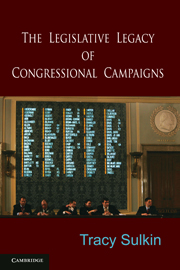Book contents
- Frontmatter
- Contents
- List of Figures
- List of Tables
- Acknowledgments
- 1 Promises to Keep?
- 2 Campaigns as Signals
- 3 Campaign Appeals and Legislative Activity
- 4 Mechanisms Underlying Promise Keeping
- 5 Promise Making and Promise Keeping on Defense and Environmental Issues
- 6 The Who, When, and Where of Follow-through
- 7 The Electoral Implications of Promise Keeping
- 8 Promises and Policy Making
- 9 Representation, Responsiveness, and the Electoral Connection
- References
- Index
3 - Campaign Appeals and Legislative Activity
Published online by Cambridge University Press: 05 June 2012
- Frontmatter
- Contents
- List of Figures
- List of Tables
- Acknowledgments
- 1 Promises to Keep?
- 2 Campaigns as Signals
- 3 Campaign Appeals and Legislative Activity
- 4 Mechanisms Underlying Promise Keeping
- 5 Promise Making and Promise Keeping on Defense and Environmental Issues
- 6 The Who, When, and Where of Follow-through
- 7 The Electoral Implications of Promise Keeping
- 8 Promises and Policy Making
- 9 Representation, Responsiveness, and the Electoral Connection
- References
- Index
Summary
At the heart of my approach to promise making and promise keeping are candidates' and legislators' agendas. Understanding the nature of the linkages between them enables me to address the central questions that motivate my analyses. First, do campaign appeals serve as good signals about the content of legislators' policy activity in office? In other words, by observing the issues that candidates talk about and how they discuss them, can we predict how actively they will pursue them in Congress? Second, what explains why some legislators are more attentive to their campaign appeals than others, devoting a larger portion of their agendas in office to the issues they highlighted in their campaigns? Third, what implications does promise keeping have for legislators' electoral fortunes and for the policy-making process? Does following through on their promises help representatives and senators to achieve their reelection goals, and what sort of legacy does it leave in the congressional agenda and in public policy outputs?
The analyses in this chapter are intended to offer an initial answer to the first of these questions. However, before moving on to investigate the relationships between campaign and legislative priorities, it is first necessary to explore their individual content in more detail. The scope and variation in candidates' and legislators' agendas provide crucial background for putting findings about promise keeping into context. Equally important, my conception of promise keeping relies upon several assumptions about the nature of agendas, so studying them directly allows me to test these assumptions.
- Type
- Chapter
- Information
- The Legislative Legacy of Congressional Campaigns , pp. 45 - 77Publisher: Cambridge University PressPrint publication year: 2011



